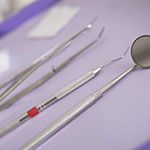Sleep apnea is a breathing disorder that can have a negative impact on your physical, emotional, and mental health. Our Ottawa dentists explain the condition and offer advice on when dental surgery may be required.
What is sleep apnea?
Sleep apnea is a serious breathing disorder that is characterized by brief but often frequent interruptions during sleep.
If your airway becomes partially blocked, the palatal tissues vibrate, producing the sound we all know and recognize as snoring. Obstructive sleep apnea occurs when the airway is completely blocked for periods of time.
As you might expect, this condition has a significant negative impact on patients' physical, mental, and emotional health. There are numerous treatment options available, such as oral appliances and CPAP machines. Surgery may be recommended in rare cases. We'll explain why later.
How can sleep apnea impact my health?
Tired but unable to sleep? Sleep apnea can cause a variety of serious mental and physical health problems, ranging from interrupted sleep in the short term to put you at risk for cardiovascular disease, depression, and, eventually, premature death.
Symptoms of sleep apnea
Left untreated, obstructive sleep apnea can put you at risk for numerous health conditions, including:
- Lack of energy
- Awakening with a headache or dry mouth
- Extremely loud snoring
- Irritability
- Cardiovascular disease
- Stroke
- Heart attack
- Problems with memory, or memory loss
- Depression
As many people are aware, snoring can disrupt a spouse's sleep. However, there is hope for finding the right treatment method that takes the patients' needs into account and effectively resolves this medical condition.
How is sleep apnea treated?
There are many successful treatments for sleep apnea. Depending on your needs, your dentist may recommend:
Oral Appliances
We can provide or recommend custom-fitted oral appliances to move your tongue and lower jaw muscles to keep your airway open. This improves airflow and keeps you from waking up during the night.
CPAP Machine
These electronic devices, known as Continuous Positive Air Pressure Machines, use an internal fan to draw air inside. The air is then humidified and pressurized before being delivered to the user via a connective base and face mask, through which they breathe.
Surgery
We take a non-invasive approach to dental care at Sandy Hill Dental, reserving surgery for rare cases that cannot be successfully treated with other methods such as oral appliances or lifestyle changes.
Do I need sleep apnea surgery?
If no other treatment options have worked, one or more surgeries may be recommended. Surgical options include:
- Uvulopalatopharyngoplasty (UPPP) to remove and reposition excess tissue in the throat and widen the airway.
- Radiofrequency Volumetric Tissue Reduction (RFVTR) to shrink and tighten tissues in and around the throat.
- Septoplasty and Turbinate Reduction to straighten a bent or deviated nasal septum.
- Hyoid Suspension to pull the hyoid bone (located in the neck) forward and secure it in place, enlarging the space for breathing in your lower throat.
- Maxillomandibular osteotomy (MMO) and advancement (MMA) for people with severe sleep apnea. The bones of the jaws are cut and will heal over months.
These are a few surgical procedures that may effectively treat sleep apnea. Your dentist may recommend a less common one depending on your case and requirements.



